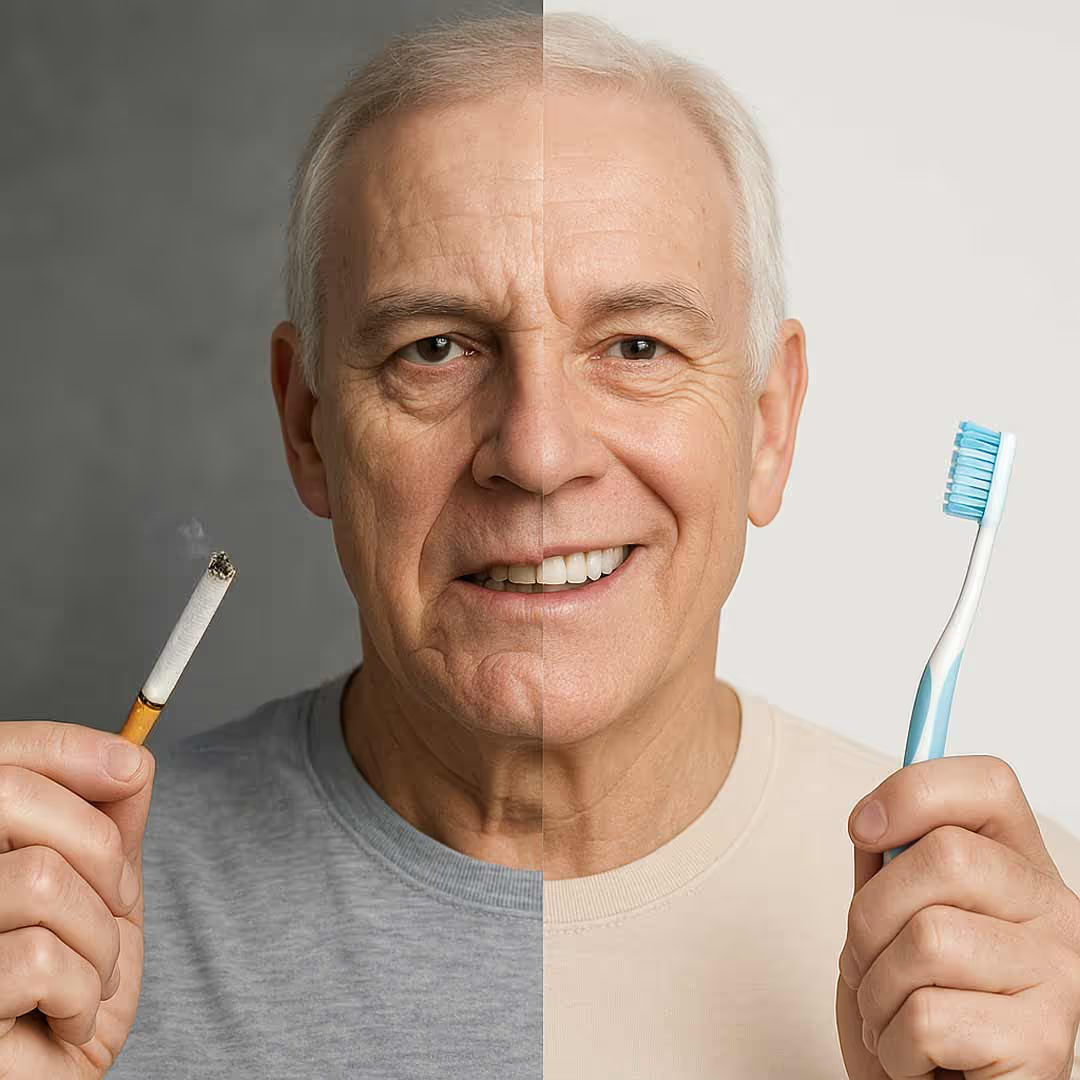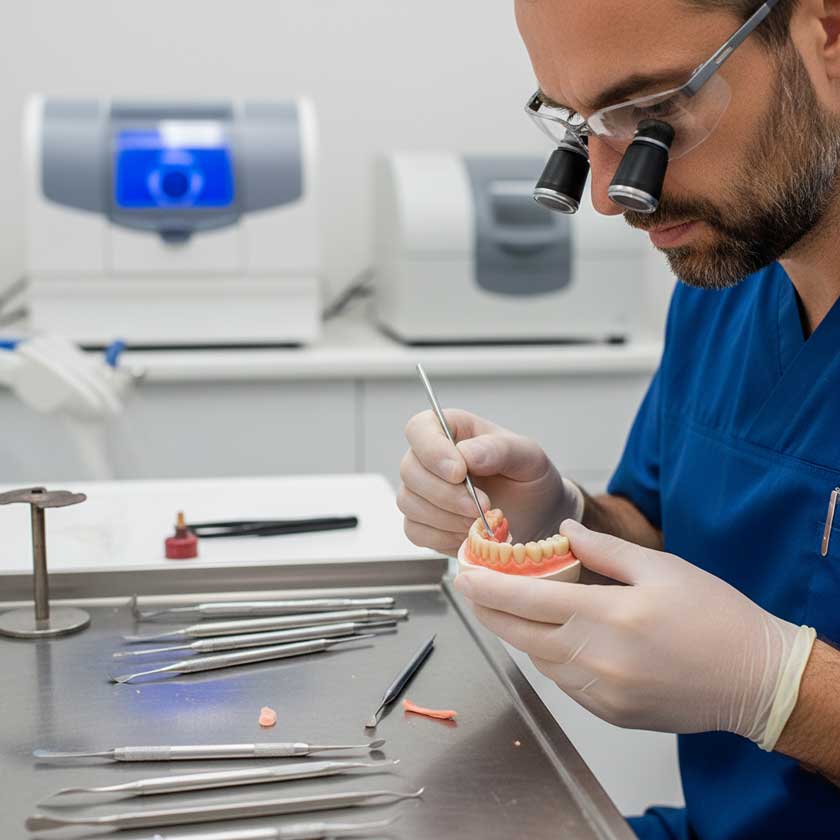Protecting your smile and health.
Smoking is a habit that affects many adults, including a significant number who rely on dentures for a functional and confident smile. In fact, statistics show that denture use is notably common among older smokers, with around 43% of current smokers aged 65 and older having lost all their natural teeth (cdc.gov). If you wear dentures and smoke, understanding the profound impact tobacco has on your oral health is the first step towards protecting your well-being, ensuring your dentures remain comfortable, and maintaining your overall health.
Smoking creates numerous problems for denture wearers. It significantly increases the risk of gum disease, potentially weakening the very tissues your dentures rely on for support (headstart.gov). The nicotine in tobacco restricts blood flow, which can slow down healing after dental procedures like extractions or denture adjustments, making the process more difficult and uncomfortable (dentistrymagazine.com). Furthermore, smoking dramatically elevates the risk of developing oral cancers (webmd.com). Even the appearance and lifespan of your dentures can be compromised, as tar and nicotine cause unsightly staining and may necessitate more frequent replacements (kerrydentureclinic.com).
Recognizing these serious risks underscores why quitting smoking is one of the best decisions you can make for your oral and overall health as a denture wearer. Quitting leads to significant improvements in oral health, enhances the comfort and fit of your dentures, and reduces the likelihood of smoking-related complications. Regular dental check-ups, like those offered at [Link to NewSmileDenture Consultations/Services], are also crucial. These visits allow your dental team to monitor your oral health, check for early signs of issues exacerbated by smoking (like gum disease or oral cancer), and ensure your dentures fit properly, especially as your mouth heals and adapts after quitting.

How smoking harms your oral health and dentures?
Smoking poses a wide array of risks to your oral health, particularly when you wear [Link to NewSmileDenture Denture Info Page] dentures. These effects can compromise the comfort, fit, and longevity of your dentures, as well as your overall well-being. Here’s a breakdown of the key impacts:
- Increased Risk of Gum Disease: Smoking significantly elevates your chances of developing gum disease (periodontal disease). Smokers are reportedly twice as likely as non-smokers to experience this condition (headstart.gov). Gum disease causes inflammation, infection, and weakening of the gum tissues that are essential for securely supporting your dentures, potentially leading to instability and discomfort.
- Higher Rates of Tooth Loss & Jawbone Changes: Smoking accelerates bone loss in the jaw and damages the tissues supporting natural teeth, contributing to higher rates of tooth loss. This is why many smokers eventually need dentures (cdc.gov). Furthermore, smoking can cause ongoing changes in the shape of your jawbone, negatively affecting how well your dentures fit over time and necessitating more frequent adjustments or relines.
- Slowed Healing & Complications: Nicotine constricts blood vessels, reducing the vital flow of oxygen and nutrients to your oral tissues. This impaired circulation significantly slows down healing after dental procedures such as tooth extractions, implant placements, or even routine denture fittings and adjustments (dentistrymagazine.com). Denture wearers who smoke may experience more post-procedure pain, a higher risk of infection, and a longer recovery period.
- Increased Risk of Oral Cancer: Tobacco use is a primary cause of oral cancers. Smokers are estimated to be six times more likely than non-smokers to develop these potentially life-threatening diseases (webmd.com). Early detection can be challenging for denture wearers, as symptoms like sores or changes in tissue might be initially mistaken for simple denture irritation, delaying crucial diagnosis and treatment.
- Denture Staining & Discoloration: The tar and nicotine in cigarettes readily penetrate the porous material of dentures, causing persistent yellow or brown staining and unpleasant odors (kerrydentureclinic.com). This significantly impacts the aesthetic appearance of your smile and often requires intensive cleaning or even premature replacement of the dentures, adding extra cost and inconvenience.
- Reduced Taste and Smell: Smoking damages taste buds and olfactory receptors, dulling your sense of taste and smell. For denture wearers, this can lead to decreased enjoyment of food, potentially affecting appetite, nutritional intake, and overall quality of life.
- Increased Risk of Oral Infections: By weakening the immune system, smoking makes denture wearers more susceptible to oral infections, particularly fungal infections like oral thrush (Candida). Thrush can cause significant discomfort, redness, and irritation, making it difficult or painful to wear dentures.
- Altered Oral Tissues & Poor Denture Fit: Chronic exposure to tobacco smoke can cause adverse changes in the soft tissues lining your mouth, leading to thickening, inflammation, or reduced elasticity. These changes often result in dentures becoming ill-fitting, causing chronic irritation, painful sores, and the need for frequent adjustments to maintain comfort and function.
The benefits of quitting smoking for denture wearers.
While smoking poses significant risks, the good news is that quitting brings substantial improvements to your oral health and overall quality of life, especially as a denture wearer. Making the decision to stop smoking can lead to positive changes like these:
- Improved Gum Health: Quitting smoking allows your gums to heal. Inflammation reduces, and the progression of gum disease slows significantly (headstart.gov). Healthier gums provide better, more stable support for your [Link to NewSmileDenture Denture Info Page] dentures, leading to increased comfort and a more secure fit as your tissues regenerate.
- Faster Healing and Recovery: Without nicotine restricting blood flow, your oral tissues receive the oxygen and nutrients they need to repair effectively (dentistrymagazine.com). This means faster, smoother healing after dental procedures like extractions or denture adjustments, with fewer complications and less discomfort.
- Reduced Oral Cancer Risk: Quitting smoking dramatically lowers your risk of developing oral cancers. While the risk decreases over time, stopping tobacco use is the most critical step you can take to protect yourself from these serious diseases (webmd.com).
- Better Denture Appearance and Longevity: Say goodbye to stubborn tobacco stains! When you quit smoking, your dentures are less likely to suffer from the yellowing and discoloration caused by nicotine and tar (kerrydentureclinic.com). This improves their appearance and can potentially extend their lifespan, reducing the need for frequent, costly replacements.
- Enhanced Senses and Quality of Life: Many former smokers report a noticeable return of their sense of taste and smell after quitting. This can lead to greater enjoyment of food, improved nutrition, and a boost to your overall well-being. Combined with better oral hygiene and increased denture comfort, quitting significantly enhances your daily quality of life.
Ready to quit? Practical steps and support.
Quitting smoking is a journey, and having a plan can make all the difference. If you wear dentures and are ready to stop smoking, consider these practical steps and resources to help you succeed:
- Set Realistic Goals and a Quit Date: Start by setting achievable short-term goals, like gradually reducing the number of cigarettes you smoke each day. Choose a specific date to quit completely and prepare yourself mentally for the change.
- Build Your Support System: Don't go it alone! Inform your family and friends about your decision to quit and ask for their encouragement. Consider joining a support group (in-person or online) to connect with others facing similar challenges. Professional counseling or structured cessation programs can also provide valuable strategies and accountability.
- Consider Nicotine Replacement Therapy (NRT): NRT products like patches, gum, lozenges, inhalers, or nasal sprays can help manage withdrawal symptoms and cravings by providing controlled doses of nicotine. Talk to your doctor or pharmacist to determine which NRT option might be right for you and how to use it effectively.
- Explore Other Cessation Aids: In addition to NRT, there are prescription medications available that can help reduce cravings and withdrawal symptoms. Discuss these options with your healthcare provider to see if they are appropriate for your situation.
- Find Healthy Coping Mechanisms: Identify your smoking triggers and develop strategies to manage cravings when they arise. This could include activities like exercise, deep breathing, drinking water, chewing sugar-free gum, or engaging in a hobby to distract yourself.
- Utilize Free Resources: Take advantage of excellent free resources available to help you quit. Websites like Smokefree.gov and the CDC's Tips From Former Smokers offer valuable information, tools, and support networks. Many areas also have free telephone quitlines (e.g., 1-800-QUIT-NOW).
Remember, quitting smoking often takes multiple attempts. Be patient with yourself, celebrate small victories, and don't hesitate to seek help from healthcare professionals or support resources.
Take control: A healthier future for you and your dentures
For individuals who wear dentures, quitting smoking is a powerful step towards better oral health, improved comfort, and enhanced overall well-being. As we've explored, smoking significantly undermines the health of your mouth and the function of your dentures, while quitting offers remarkable benefits – from healthier gums and a lower cancer risk to better-fitting, better-looking dentures and an improved quality of life.
The journey to becoming smoke-free is achievable with the right support. Utilize the practical steps and resources available, and don't hesitate to lean on healthcare professionals, including your dental team, for guidance.
Ready to discuss how quitting smoking can benefit your specific denture needs or explore options for maintaining optimal oral health? Give us a call at (208) 454-0311 or get you free consultation and let us support you in achieving a healthier, smoke-free smile.








